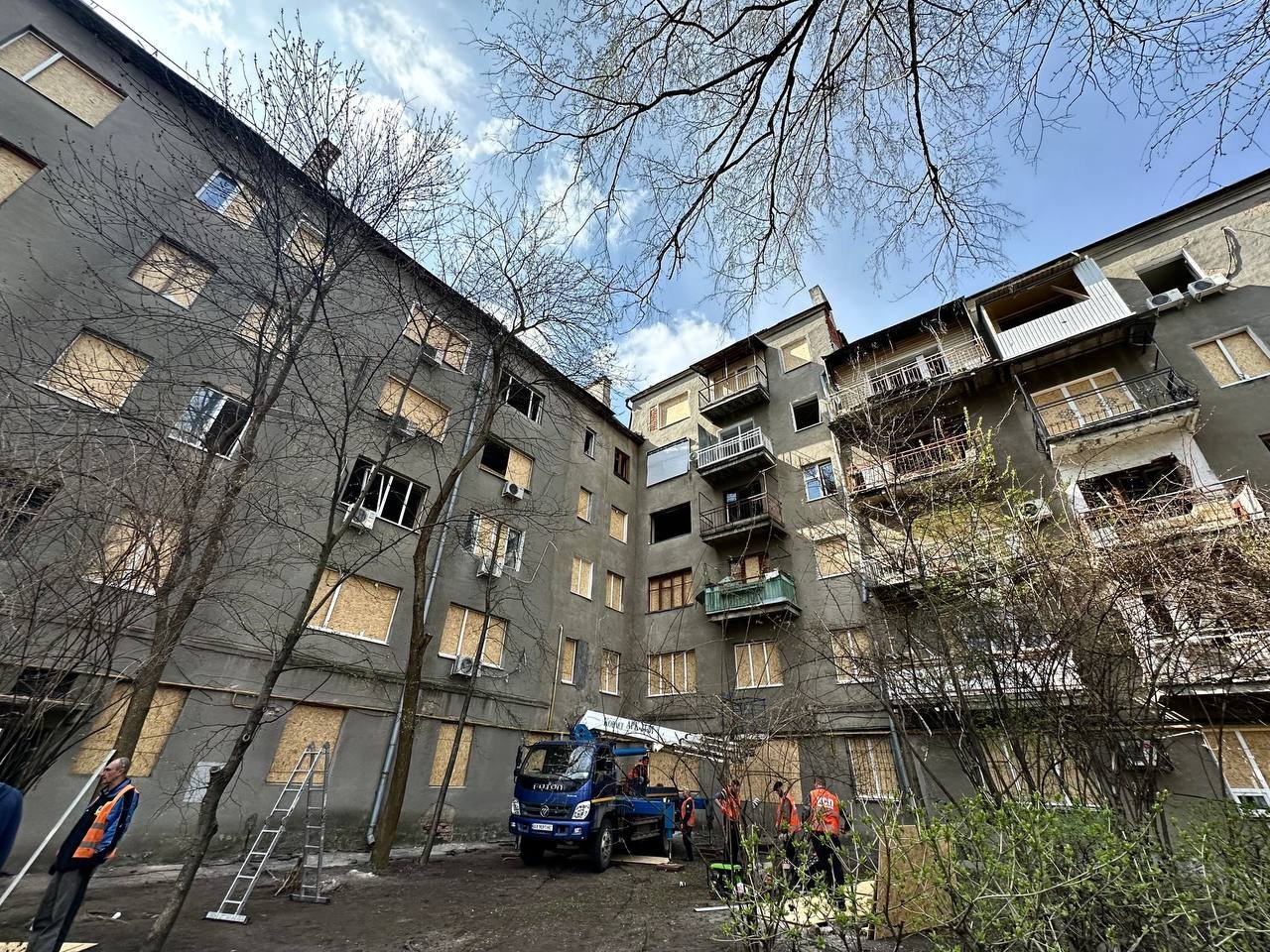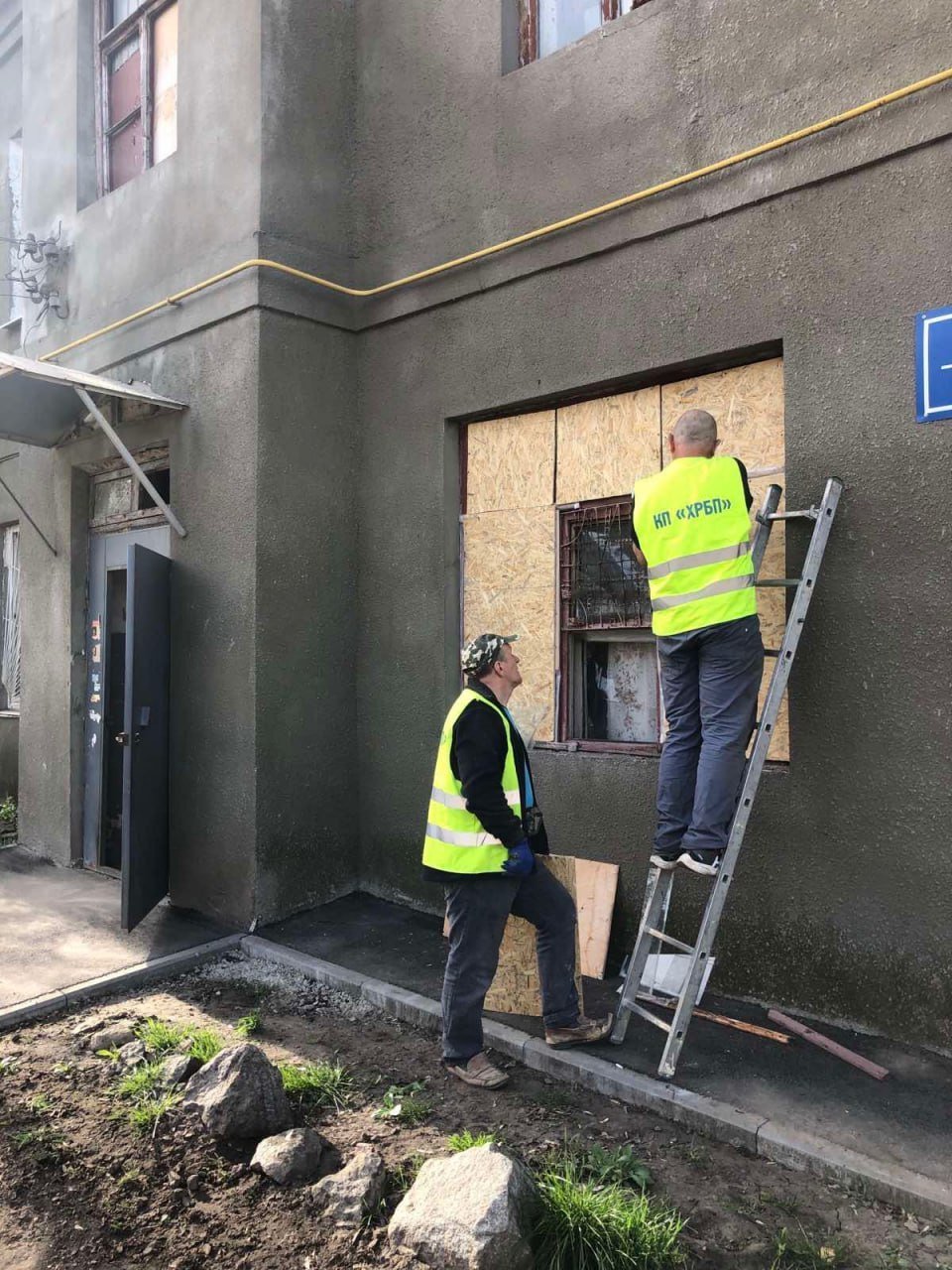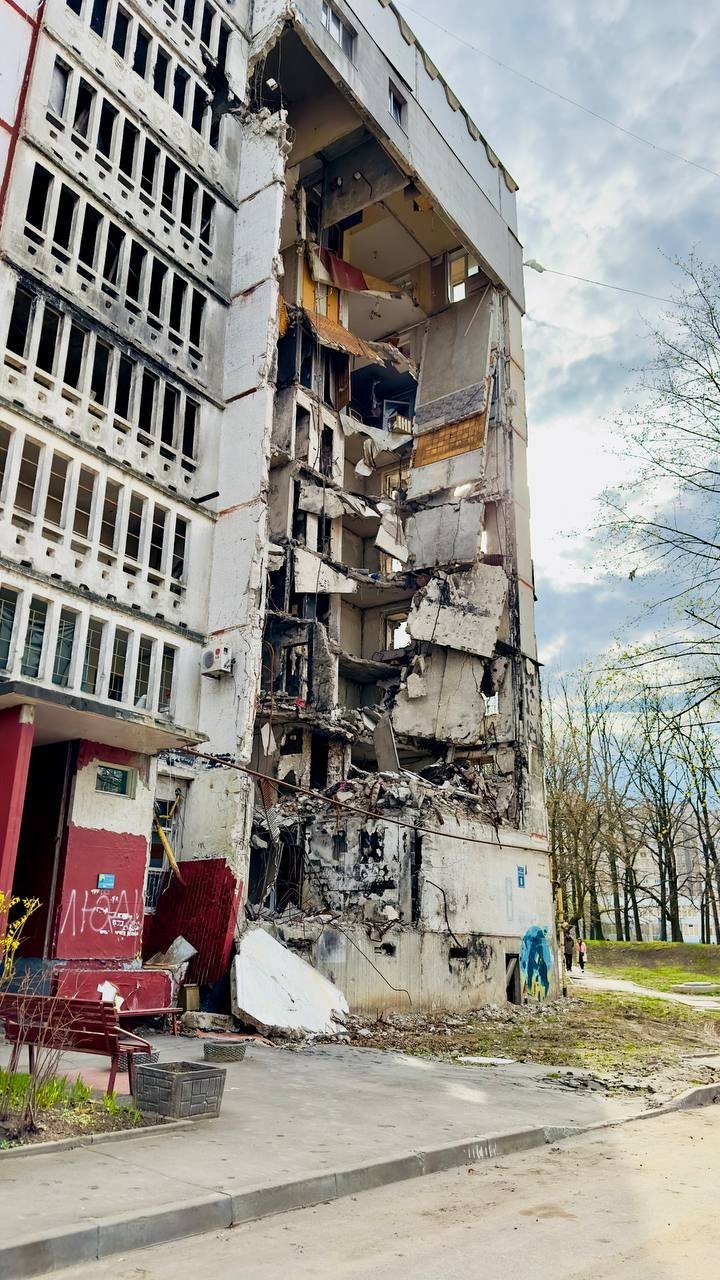Kharkiv is running on generators. What life is like under constant rocket and bomb attacks
I'm standing in the kitchen, washing the electric stove, the spring sun is shining through the open windows, and a breeze is blowing. Suddenly, there was a loud explosion. The house shook.
"Yeah, a CAB (guided aerial bomb, read more about it here - Ed.),there's probably going to be another one now, they always come in pairs", - I think. And indeed, almost immediately I hear another explosion.
I open a local chat room, and comments are already pouring in, and then there are emoticons: hearts and hands folded in prayer.
Finally, the siren turns on. I go on washing the stove.
Despite the constant shelling and power outages, many locals have returned to Kharkiv, bringing the population to about a million. Some people cannot stand it and leave their homes for the second time. Those who stayed call themselves "reinforced concrete".
Public transportation is running in the city, local businesses are quickly recovering from shelling, and bulletproof film on windows has become a city trend.
Explosions, chats, sirens
In Kharkiv, it's like this: first, there is an explosion, then emotions in chat rooms, and then anxiety. All the missiles flying at Kharkiv reach the target. After the attacks, Kharkiv residents, if they are lucky enough to remain unharmed, continue to go about their business. Hospitals, banks, restaurants, a zoo, a shopping mall, services, entertainment, and two underground schools have opened.
You just need to be able to "slip" between the missiles. And charge your phones and power banks when the electricity comes on.
YOU JUST HAVE TO "SLIP" BETWEEN THE MISSILES
Since March 22, after a period of relative calm, Kharkiv has been under daily shelling. In the morning of that day, the Russians fired 20 missiles. Local anonymous telegram channels monitoring the shelling were flooded with messages: "Still flying!", "Two more explosions!", "Seventh explosion!", "Explosion! It's deafening!", "It's still flying!", "Explosion", "The light has disappeared", "It's still flying", "Explosion!", "There is still a rocket in the air".
Sitting in the corridor, we can hear every explosion, even without them. Sometimes, it's a dull sound in the distance; sometimes, it's very close, and then there's a ringing in the ears and a lump in the throat.
We are all in touch with our loved ones from other districts, we are all waiting to see who it will come to this time.
I'm standing there, leaning against the front door, writing or reading something, and waiting to see if it hits me.
Someone writes in the chat room: "That's it. The light, my windows, and my nervous system are all gone. It hit right next to me, and it's gone." And immediately a reply: "Oh, my God, Kharkiv... (((( I don't know what to write(( We hug you from all of Kyiv."
My friends and I also started a joint chat to check if everyone was alive and well:
- "Is everyone okay?
- We are fine. There is no electricity, and I'm sleepy.
- Everything is fine. No light, no water, just((.
It is challenging in Kharkiv to have no mutual support, especially moral one. Even the administrator of a popular anonymous Telegram channel in the city writes after the attacks are over: "Are you okay, relatives?"
After that March attack, our Kharkiv CHP-5, a giant of electricity production that provided electricity to Kharkiv and neighboring regions, no longer exists. Zmiivska and Pisochinska CHPs were destroyed.
Night drones
At night, the city is terrorized by enemy Shahed drones. The worst attack was on April 4: more than 20 of them flew into the city - there were several waves of 5-7 of them.
As usual, I wait in the corridor near the door. They say the best chance to survive is under the door frame. I also read what is written in Telegram chats.
And there's more bad news: "The city center and the southern part are heading your way," "Another bastard from the north is entering our region," "The northern pit bull has set a course for the city. The northern districts are taking cover again", "Another one from the north is heading for the city".
At this point, car engines roar and shots are heard from outside. Sometimes, my curiosity overcomes my fear, and I go to the window to watch the night sky pierce with bursts of small red bullets and then larger yellow ones. The sound outside becomes more voluminous and deafening. I see huge searchlights "feeling" the sky. These are our mobile fire teams hunting for the Shaheds.
We are very grateful to our air defense forces for their selfless defense of the city.
Harbingers
During the day, enemy reconnaissance drones hover over Kharkiv almost every day. We cannot see them - they are very high up. But we learn about them again from local Telegram channels. By the way, the administrator of one of them, although anonymous, organized charity events in the city: mass blood donations or the purchase of electric vests for the military for the winter.
A reconnaissance drone is often a harbinger of shelling, and you automatically go into "waiting for trouble" mode.
Sometimes, the townspeople are indignant that our fire groups do not shoot down the spies. The answer is in the same telegram: "Now the Russians have raised the altitude of their drones, improved their optics, and this shit is hovering at an altitude of 2 to 3 km. It's a shitty small point, which is very difficult to shoot down at that altitude."
Blackouts
Electricity is still hard to come by in the city. Communications and the Internet are also poor. The city lives in a blackout mode for 3-5-7 hours a day. Kharkiv and the region can no longer provide electricity on their own - electricity is redirected here from other regions. It is impossible to keep to the blackout schedules because the damage is so severe that there is insufficient capacity.
The city is practically running on generators. Of course, the critical infrastructure is powered without interruption. And local businesses are turning on their generators with ironclad calmness and continuing to operate.
Ordinary consumers rush to charge their power banks and charging stations when the power comes back on because there is no telling when the power will go out and when it will come back on.
It happened that a few days after the shelling, the electricity was already constant, then the shelling started again, and we were without electricity again for who knows how long.
Transportation
The massive shelling on March 22 left the city without electric transportation. Buses were promptly launched along the metro routes - the relevant routes were developed during the first blackouts in the first year of the war.

Two days later, Mayor Ihor Terekhov happily reported: "By some miracle, our power engineers have managed to launch the subway." It was a huge relief. As for trolleybuses, only a few routes have been reopened so people can get to the main metro stations. Tram routes are gradually being restored.
On April 11, there was another shelling. The subway was back to normal, although a few hours later, it was launched, but at long intervals.
Bulletproof film
Every day I visit the Instagram page of radio journalist Joe Lindsley, who now lives in Kharkiv, and I am glad that he is conveying the right message about us to his American audience:
"Kharkiv demonstrates that it is possible to be 30 kilometers from the Russian border under such frequent attacks and still be a pleasant place to live between those attacks. New businesses are opening here even now. You'd be amazed how these people keep going, keep growing, even knowing that at any moment, a strike could destroy everything," Joe says.
It is indeed true. Anton and Lilya, the popular Pakufood coffee shop owners, are good old friends of mine. In the winter, a rocket exploded right in front of the entrance to their place. Huge glass windows were blown out, walls in the halls were damaged, but people were all alive - they managed to run to the basement in time.
AN ADVERTISEMENT ON THE CAFE: "THIS GLASS IS COVERED WITH BULLETPROOF FILM FOR YOUR COMFORT"
"The utilities came right away and cleaned up everything," says Anton. "They brought OSB sheets (oriented strand board - Ed.) and helped us close the windows with them. It is clear that Kharkiv already has a lot of experience in this. We then worked for quite a long time with the windows boarded up, with no glass at all."
The new windows at Pakufood were covered with bulletproof film. This is a new trend in Kharkiv establishments. Those who can afford it make such windows and write on them: "This glass is covered with bulletproof film for your comfort."
This gives visitors a sense of security and reminds them of the war.
Another rocket destroyed the Franyk coffee shop, which opened in the war year of 2023. "Franyk immediately became a favorite place for Kharkiv residents. The missile strike destroyed both their pleasant glazed terrace and the interior. But they immediately wrote on their social media: "We will definitely rebuild everything and wait for you again." Today the coffee shop is already open.
Reinforced concrete
In the city center, many windows are covered with OSB sheets. But this does not make the atmosphere in the city depressed. On the contrary, it gives us confidence and demonstrates what kind of "reinforced concrete" we are. After all, people live and work inside, behind the boarded-up windows.

Neatness and clean streets are what Kharkiv was known for even before the full-scale war. And it hasn't changed either. "We are under fire, but the utilities are working, the garbage is being taken out," the mayor comments. Sometimes, we hear "drum-drum-drum" under the windows during shellings - a small garbage truck is working.
Northern Saltivka
My home neighborhood is Northern Saltivka. It seems that everyone in Ukraine and abroad knows about it now - it was continuously shelled in 2022. In the first months of the full-scale war, it was continuously shelled with heavy artillery, airplanes, and small artillery (read our project about this area here). Tank battles took place a few blocks from my house.
My house almost survived. It was hit by a rocket only once, and half of the balcony collapsed. In our neighborhood, we call it, "Your house is fine!". But wherever you look in Northern Saltivka and the neighboring districts, you see ruins of buildings, entire entrances collapsed, burnt-out local markets, abandoned gas stations, and soot from fires that have not been washed off the walls of high-rise buildings even after two years.
Small grocery stores and even supermarkets are opening here. Government offices are open, transportation is running, and people are walking.

Schools
But it is quiet near schools and kindergartens. Children's noise is not heard anywhere. The city's school and preschool educational institutions are closed due to the constant threat of shelling. Bombs have destroyed many schools.
Children who stay in the city continue their studies. The second underground school was opened in Kharkiv. The first underground school was the metro school opened last year. There, children study in underground corridors and subway passages that have been turned into classrooms. The second underground school has just been completed, but the educational process has not yet begun.
A performance "at the specified coordinates."
Another marker of Kharkiv's resilience is its cultural life. The city hosts concerts, theater performances, and stand-up comedians.
"You can't get into the exquisite historic hall of the National Academic Ukrainian Drama Theater named after Taras Shevchenko," says Kharkiv resident Halyna, "but I still went to a performance. My friend at work got tickets. So we went to the specified coordinates, went to a cafe, and went down to the basement, where there was a rather large hall, a stage, and a performance! A breath of cultural life!"
"WE WENT TO A CAFE, WENT DOWN TO THE BASEMENT, AND THERE WAS A RATHER LARGE HALL, A STAGE, AND A PERFORMANCE!"
The zoo is also open. Just before the war, it was completely reconstructed according to a modern design and standards that consider all the needs and comfort of animals.
Language
And something else very important. Today's Kharkiv is filled with the Ukrainian language. This is probably the last thing I expected from my hometown, not only in the service sector, where it is the law to speak the state language to a client.
Every day, communication between people is increasing in Ukraine. There is no gradation by age or other factors: you hear Ukrainian from both young and old in the city center and residential areas. Sometimes, I see a group of adults walking with small children, and the adults speak Russian to each other. When they say something to the children, they switch to Ukrainian.
Even the mayor of Kharkiv, who not so long ago paid fines several times for using Russian in official communication, now, when he arrives at every arrival, gives comments in Ukrainian, finishing each phrase: "Kharkiv will survive, glory to Ukraine."
How are we holding up?
I asked many people from my circle of friends in Kharkiv and random people with whom I had a conversation somewhere in the city how they felt.
"We, Kharkiv residents, are made of iron, right? We will survive."
This article was originally written in Ukrainian. It has been translated into English using AI tools such as DeepL, ChatGPT, and Grammarly. If you encounter an error that requires immediate attention, please inform us via Facebook, Twitter, or Instagram. Your understanding and support are appreciated.

